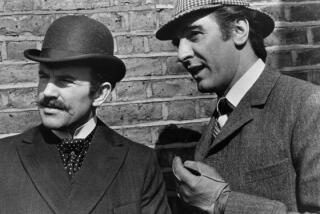Keeping the coins in a jar by the door
- Share via
Patrick Halling is fighting to keep the few cents he earns every time the Beatles’ “Eleanor Rigby” airs on the radio.
The Beatles song was released in 1966 and under European Union law will enter the public domain in 2016, meaning Halling’s violin-led string background on the song will lose its copyright protection and the royalties will end.
“I feel it is unfair that it should just be finished,” said Halling, an 84-year-old classically trained violinist who played on many early Beatles songs at EMI Music. Halling makes several thousand dollars a year from hundreds of songs he recorded with artists such as Tom Jones, the Moody Blues and Enya.
Halling is among about 40,000 United Kingdom artists who rely on music royalties to get by. They’re pushing lawmakers to change the rules and extend the paydays, setting up a showdown with those who pay the fees for using music as part of their business: radio stations, Internet sites, cafes and even hairdressers.
“We may be talking about small [amounts], but they’re significant if you’re talking about people who aren’t stars,” said Richard Mollet, director of public affairs at the British Recorded Music Industry Ltd., which licenses recorded music on behalf of more than 3,400 U.K. record companies and 38,000 performers worldwide. “In the end, the small amounts going to these session musicians are highly welcomed.”
Those who write music and lyrics in both the European Union and the United States receive dividends from their work for their lifetimes plus 70 years. Contributing studio musicians and singers in the European Union are initially paid for making the recording, then receive royalties for only 50 years.
A recommendation to change the law to match the time limit of the U.S., where songwriters or their estates collect money for 95 years, will soon be debated in the European Parliament.
The fate of musicians such as Halling has been in the spotlight in the U.K. since British pop icon Sir Cliff Richard’s first hit, 1958’s “Move It,” entered the public domain last year. Richard’s first No. 1 song, 1959’s “Living Doll,” will follow in July.
In a video message on behalf of U.K. performers at Abbey Road Studios last month, Halling and 27 others, including guitarists, vocalists, trombonists and bassists who played with the Beatles, the Rolling Stones and Madonna, urged U.K. Prime Minister Gordon Brown to support the change.
The video message is part of the Fair Play for Musicians Campaign. The group also has taken out a full-page newspaper advertisement in support of the cause and sent a petition signed by 99 artists to Brown last month. U2, Paul McCartney and the Who’s Roger Daltrey have supported extending the copyright for musicians.
More to Read
The biggest entertainment stories
Get our big stories about Hollywood, film, television, music, arts, culture and more right in your inbox as soon as they publish.
You may occasionally receive promotional content from the Los Angeles Times.










